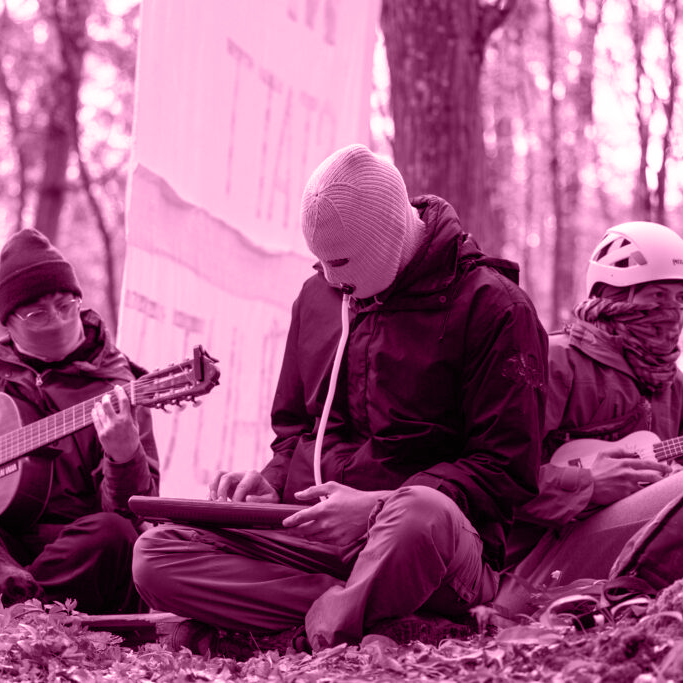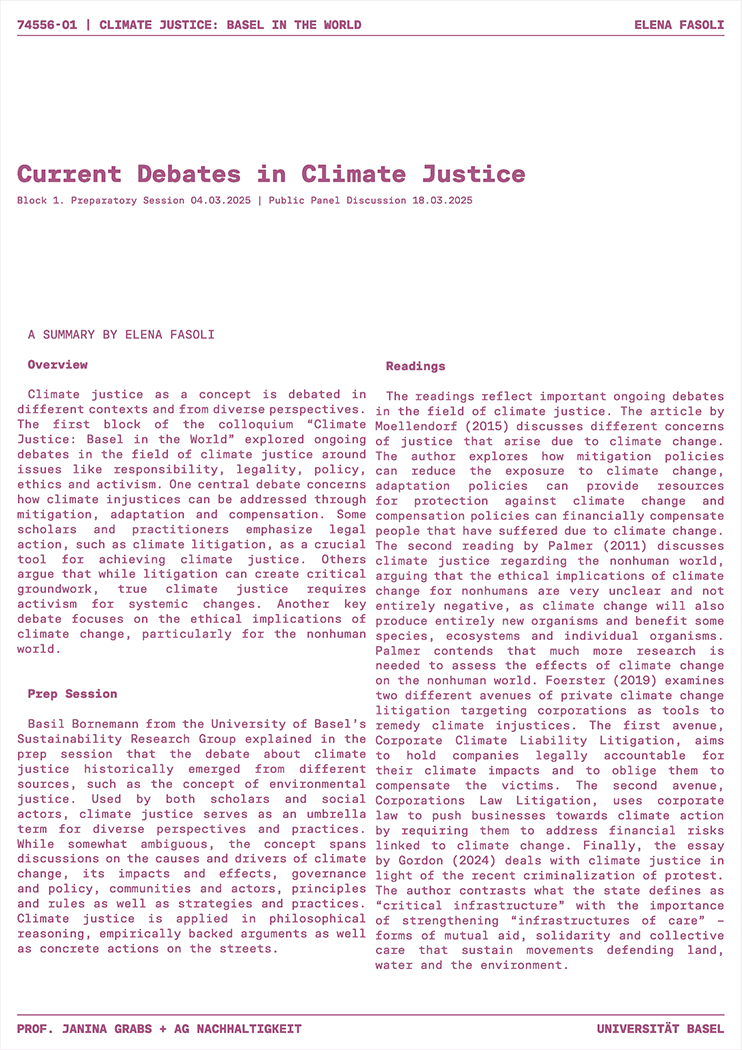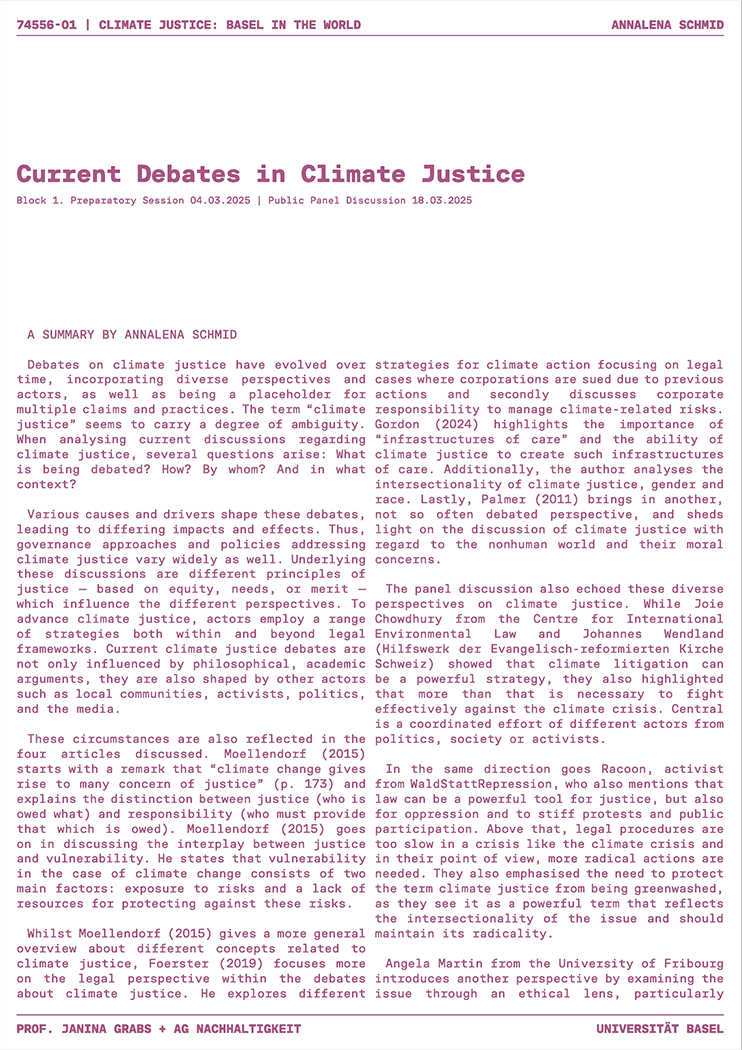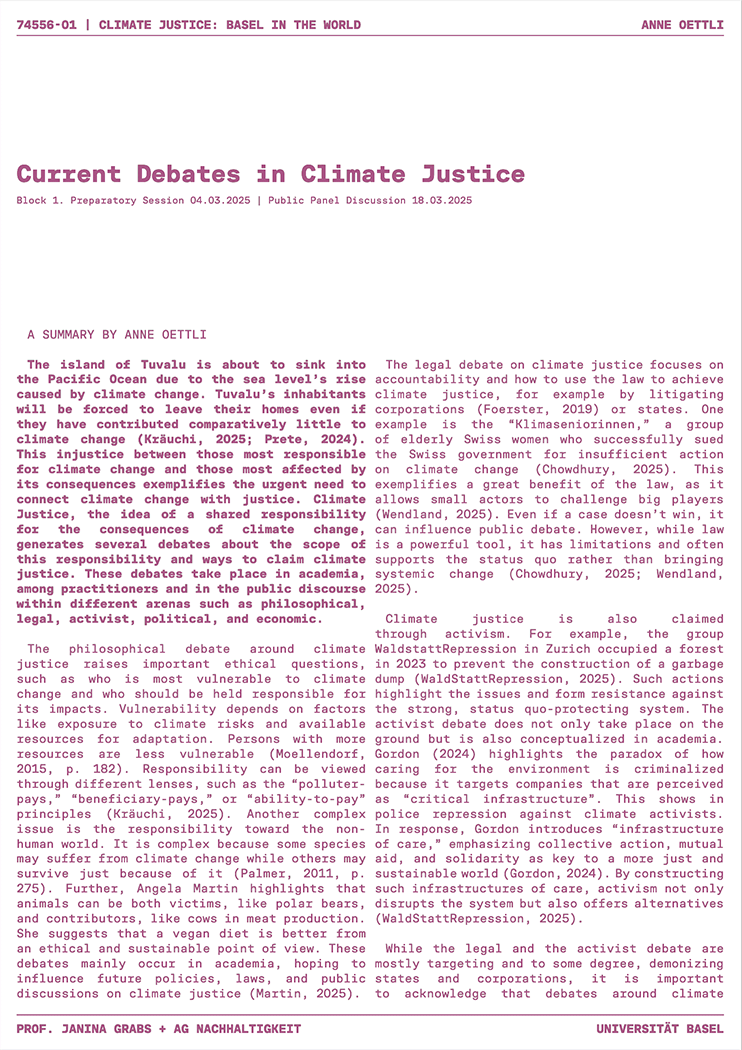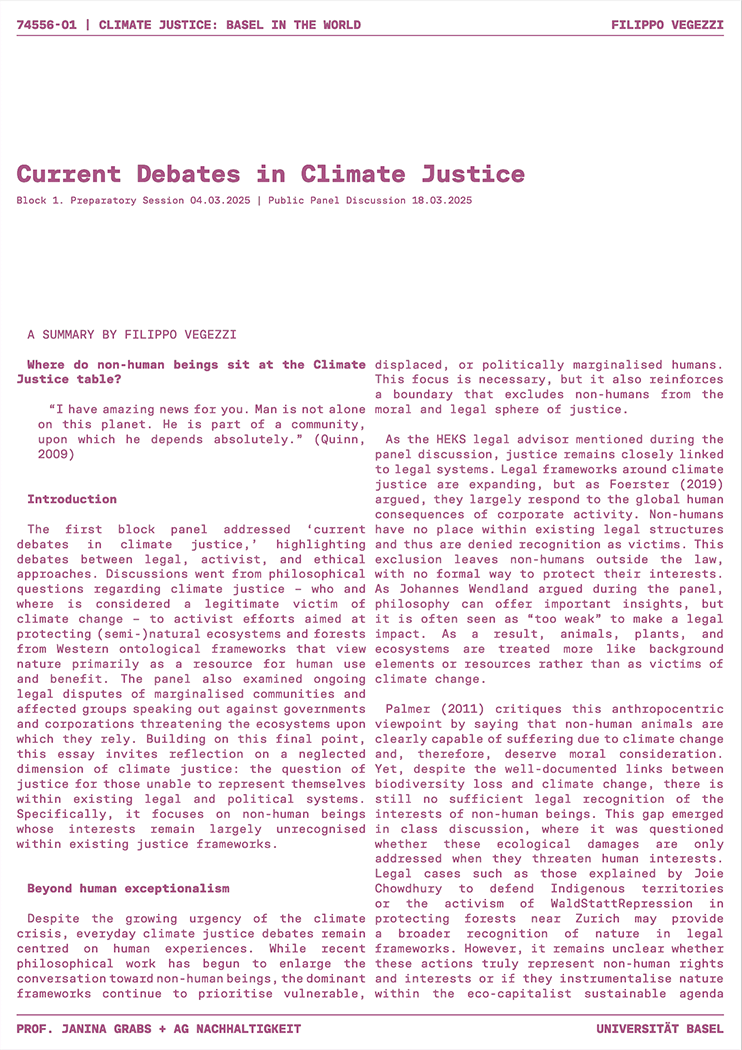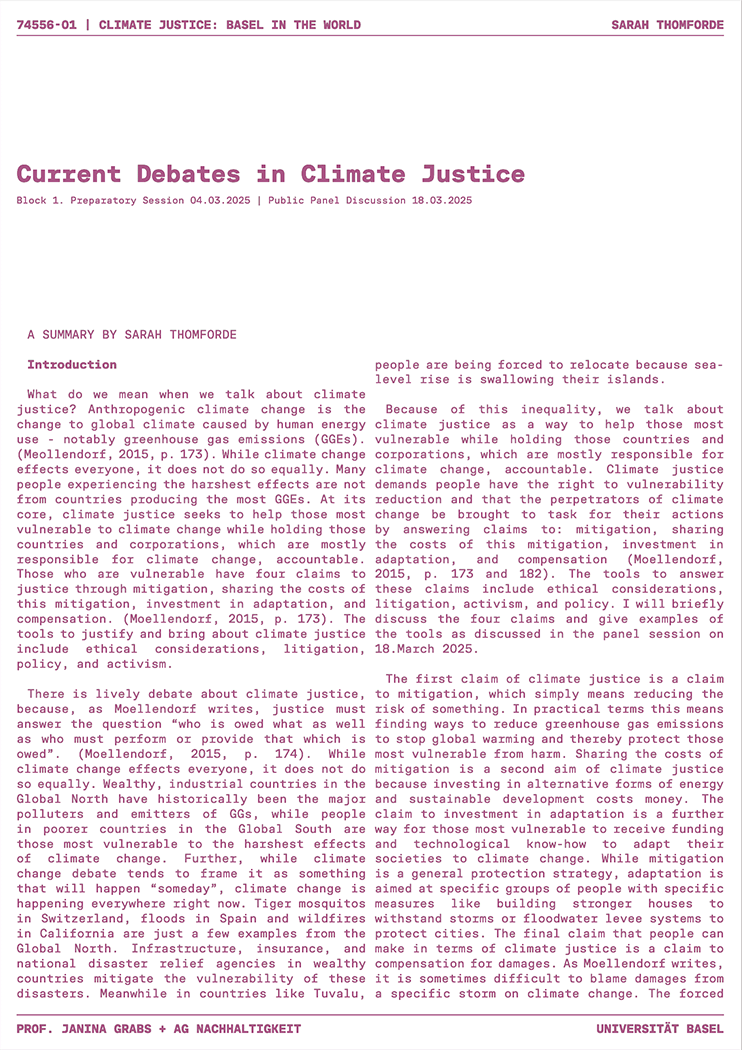Climate Justice: Basel in the World is a colloquium at the University of Basel, co-organized in the spring semester 2025 by students from the AG Nachhaltigkeit and Prof. Dr. Janina Grabs. It is supported through funding by Impuls.
Twenty experts from across academia and practice have been invited to share their insights and experiences thinking about and fighting for justice in the climate crisis. Join us at the four public panel discussions this spring to learn about the concept of climate justice, progressing from fundamental theory via global practices to perspectives firmly rooted in experiences local to Basel.
Twenty experts from across academia and practice have been invited to share their insights and experiences thinking about and fighting for justice in the climate crisis. Join us at the four public panel discussions this spring to learn about the concept of climate justice, progressing from fundamental theory via global practices to perspectives firmly rooted in experiences local to Basel.
Block 1 | Public Panel Discussion
Current Debates in Climate Justice
Tuesday, March 18th, 16.15-18.00, Hörsaal 117, Kollegienhaus
Moderated by Dr. Basil Bornemann

SUMMARY BY ELENA FASOLI
Climate justice as a concept is debated in different contexts and from diverse perspectives. The first block of the colloquium “Climate Justice: Basel in the World” explored ongoing debates in the field of climate justice around issues like responsibility, legality, policy, ethics and activism. One central debate concerns how climate injustices can be addressed through mitigation, adaptation and compensation. Some scholars and practitioners emphasize legal action, such as climate litigation, as a crucial tool for achieving climate justice. Others argue that while litigation can create critical groundwork, true climate justice requires activism for systemic changes. Another key debate focuses on the ethical implications of climate change, particularly for the nonhuman world.
Current Debates in Climate Justice
Tuesday, March 18th, 16.15-18.00, Hörsaal 117, Kollegienhaus
Moderated by Dr. Basil Bornemann

SUMMARY BY ELENA FASOLI
Climate justice as a concept is debated in different contexts and from diverse perspectives. The first block of the colloquium “Climate Justice: Basel in the World” explored ongoing debates in the field of climate justice around issues like responsibility, legality, policy, ethics and activism. One central debate concerns how climate injustices can be addressed through mitigation, adaptation and compensation. Some scholars and practitioners emphasize legal action, such as climate litigation, as a crucial tool for achieving climate justice. Others argue that while litigation can create critical groundwork, true climate justice requires activism for systemic changes. Another key debate focuses on the ethical implications of climate change, particularly for the nonhuman world.
Basil Bornemann from the University of Basel’s Sustainability Research Group explained in the prep session that the debate about climate justice historically emerged from different sources, such as the concept of environmental justice. Used by both scholars and social actors, climate justice serves as an umbrella term for diverse perspectives and practices. While somewhat ambiguous, the concept spans discussions on the causes and drivers of climate change, its impacts and effects, governance and policy, communities and actors, principles and rules as well as strategies and practices. Climate justice is applied in philosophical reasoning, empirically backed arguments as well as concrete actions on the streets.
The readings reflect important ongoing debates in the field of climate justice. The article by Moellendorf (2015) discusses different concerns of justice that arise due to climate change. The author explores how mitigation policies can reduce the exposure to climate change, adaptation policies can provide resources for protection against climate change and compensation policies can financially compensate
people that have suffered due to climate change. The second reading by Palmer (2011) discusses climate justice regarding the nonhuman world, arguing that the ethical implications of climate change for nonhumans are very unclear and not entirely negative, as climate change will also produce entirely new organisms and benefit some species, ecosystems and individual organisms. Palmer contends that much more research is needed to assess the effects of climate change on the nonhuman world. Foerster (2019) examines two different avenues of private climate change litigation targeting corporations as tools to remedy climate injustices. The first avenue, Corporate Climate Liability Litigation, aims to hold companies legally accountable for their climate impacts and to oblige them to compensate the victims. The second avenue, Corporations Law Litigation, uses corporate law to push businesses towards climate action by requiring them to address financial risks linked to climate change. Finally, the essay by Gordon (2024) deals with climate justice in light of the recent criminalization of protest. The author contrasts what the state defines as “critical infrastructure” with the importance of strengthening “infrastructures of care” – forms of mutual aid, solidarity and collective care that sustain movements defending land, water and the environment.
Current Debates in Climate Justice
The panel discussion brought together different perspectives on ongoing debates regarding climate justice. Simon Kräuchi from the University of Fribourg explored climate justice in terms of historical justice and distributive justice, linking these to three important policy areas where climate justice might apply: mitigation, adaptation as well as loss and damages. Philosopher Angela Martin spoke about the role of animals in climate justice, arguing that reducing or eliminating animal products is a key leverage point to addressing climate change. She also highlighted that animals are often overlooked victims of climate change, as not all animals will be able to adapt easily. Next, Joie Chowdhury from the Center for International Environmental Law discussed climate litigation as an instrument to put pressure on states and corporations. She argued that while litigation can lay critical groundwork and provide an important foundation for accountability, it must be combined with climate movements to drive change. Johannes Wendland from the Hilfswerk der Evangelisch-reformierten Kirche Schweiz talked about a specific case where four fishermen and women from Indonesia decided to take legal action against Holcim which is the world’s largest cement manufacturer. He highlighted that litigation cases can not only spark legal debates about compensation, but also influence public and political debates. Lastly, a politically engaged person from WaldStattRepression, a Swiss Climate Activist Group, spoke about the occupation of a forest near Zurich and about the repression activists faced by the police and the state. During the following panel discussion between the participants, some emphasized the need for legal action as a tool of resistance, while others warned against relying on a system that upholds the status quo. While law can create evidence and hold corporations accountable, climate justice requires broader system change and intersectional activism. ◼︎
Summary by Elena Fasoli, 24.03.2025
Moellendorf, D. (2015). Climate Change Justice. Philosophy Compass, 10(3), 173–186. doi.org/10.1111/phc3.12201
Palmer, C. (2011). Does nature matter? The place of the nonhuman in the ethics of climate change. In D. G. Arnold (Ed.), The Ethics of Global Climate Change (pp. 272–291). Cambridge University Press. doi.org/10.1017/CBO9780511732294.014
Foerster, A. (2019). Climate Justice and Corporations. King’s Law Journal, 30(2), 305–322. doi.org/10.1080/09615768.2019.1645447
Gordon, C. (2024). Criminalizing Care: Environmental Justice Under Political and Police Repression. Environmental Communication, 18(1–2), 138–145. doi.org/10.1080/17524032.2023.2296835
Moellendorf, D. (2015). Climate Change Justice. Philosophy Compass, 10(3), 173–186. doi.org/10.1111/phc3.12201
Palmer, C. (2011). Does nature matter? The place of the nonhuman in the ethics of climate change. In D. G. Arnold (Ed.), The Ethics of Global Climate Change (pp. 272–291). Cambridge University Press. doi.org/10.1017/CBO9780511732294.014
Foerster, A. (2019). Climate Justice and Corporations. King’s Law Journal, 30(2), 305–322. doi.org/10.1080/09615768.2019.1645447
Gordon, C. (2024). Criminalizing Care: Environmental Justice Under Political and Police Repression. Environmental Communication, 18(1–2), 138–145. doi.org/10.1080/17524032.2023.2296835
Block 2 | Public Panel Discussion
History and Theory of Climate Justice
Tuesday, April 1st, 16.15-18.00, Hörsaal 117, Kollegienhaus
Moderated by Prof. Dr. Jon Schubert

SUMMARY BY VYUSTI KUMAAR
What is in a person’s environment that is worth protecting? A swamp someone grew up near under threat of being ‘developed?’ A conservation park outside their city being encroached on by migrating families? A new variety of seed replacing a variety their family bred for generations? A community garden overgrown from neglect? For the environmental justice movement, this was a crucial question to answer: what is it that they were fighting for that differed from earlier conservationists? The environment for them was a good place for all to “live, work and play” (Novotny, 2000, as cited in Schlosberg and Collins, 2014 p.360). This emphasis on everyday life highlighted the unjust distribution of environmental burdens on disadvantaged communities. Similarly, a focus on environmental justice shows that while it is true that all of humanity faces climate-based burdens, it does not imply that these burdens have arisen or will affect all of humanity equally. Schlosberg and Collins (2014) describe the rise of the climate justice movement from existing environmental justice principles. They also delineate the ways in which climate justice is conceptualised: ethical debates in academia, targeted policies by elite non-governmental actors, and the deeply layered discourse arising from grassroot social movements.
History and Theory of Climate Justice
Tuesday, April 1st, 16.15-18.00, Hörsaal 117, Kollegienhaus
Moderated by Prof. Dr. Jon Schubert

SUMMARY BY VYUSTI KUMAAR
What is in a person’s environment that is worth protecting? A swamp someone grew up near under threat of being ‘developed?’ A conservation park outside their city being encroached on by migrating families? A new variety of seed replacing a variety their family bred for generations? A community garden overgrown from neglect? For the environmental justice movement, this was a crucial question to answer: what is it that they were fighting for that differed from earlier conservationists? The environment for them was a good place for all to “live, work and play” (Novotny, 2000, as cited in Schlosberg and Collins, 2014 p.360). This emphasis on everyday life highlighted the unjust distribution of environmental burdens on disadvantaged communities. Similarly, a focus on environmental justice shows that while it is true that all of humanity faces climate-based burdens, it does not imply that these burdens have arisen or will affect all of humanity equally. Schlosberg and Collins (2014) describe the rise of the climate justice movement from existing environmental justice principles. They also delineate the ways in which climate justice is conceptualised: ethical debates in academia, targeted policies by elite non-governmental actors, and the deeply layered discourse arising from grassroot social movements.
Farhana Sultana (2021) illustrates the first approach by discussing the role insights from feminist scholarship could play in shaping collective action. The debate around usage of terms like Anthropocene, Plantationocene, Capitalocene in academic practice and their implications on describing the current epoch is another example (Schubert,2025). Academic debates can seem aloof, but can be source of legitimacy and discuss the normative principles that should guide policy formation as well as their merits and drawbacks (Krächi, 2025; Moellendorf, 2015).
With the climate crisis already underway, the need for policy requirements for specific adaptation measures. Cyclone Idai wreaked havoc on Beira, Mozambique. While the World Bank committed to finance adaptation measures, the housing budget was not enough to cover all those affected. In this case, assessment of who is most vulnerable and, thus, deserving of funding is a humongous undertaking. Confusion on this matter led reconstruction to first be owner- driven, then guided by selected NGOs to have ‘proper’ reconstruction. When funds were handed over to the city, reconstruction was carried out in areas which had not been flooded in the name of city redevelopment (Schubert,2025). Criteria for such policies needs to be meticulously detailed to assess needs to affected communities. For example, in Beira, fishing community land next to the coast was developed with these funds by the local government. The village was used to water flowing in and out of the land with changing tides. The ‘development’ led to waterlogging in the newly made houses, whereas previous constructions allowed for the flow of water (Schubert, 2025). Governance need not take such a top-down approach to adaptation, which ultimately does not serve the community appropriately. Climate justice needs to be considered with other forms of social justice to be effective and this requires the de-centring of existing actors with power in decision making spaces (Newell et al, 2021).
With the climate crisis already underway, the need for policy requirements for specific adaptation measures. Cyclone Idai wreaked havoc on Beira, Mozambique. While the World Bank committed to finance adaptation measures, the housing budget was not enough to cover all those affected. In this case, assessment of who is most vulnerable and, thus, deserving of funding is a humongous undertaking. Confusion on this matter led reconstruction to first be owner- driven, then guided by selected NGOs to have ‘proper’ reconstruction. When funds were handed over to the city, reconstruction was carried out in areas which had not been flooded in the name of city redevelopment (Schubert,2025). Criteria for such policies needs to be meticulously detailed to assess needs to affected communities. For example, in Beira, fishing community land next to the coast was developed with these funds by the local government. The village was used to water flowing in and out of the land with changing tides. The ‘development’ led to waterlogging in the newly made houses, whereas previous constructions allowed for the flow of water (Schubert, 2025). Governance need not take such a top-down approach to adaptation, which ultimately does not serve the community appropriately. Climate justice needs to be considered with other forms of social justice to be effective and this requires the de-centring of existing actors with power in decision making spaces (Newell et al, 2021).
Climate Justice: Basel in the World is a colloquium at the University of Basel, co-organized in the spring semester 2025 by students from the AG Nachhaltigkeit and Prof. Dr. Janina Grabs. It is supported through funding by Impuls.


